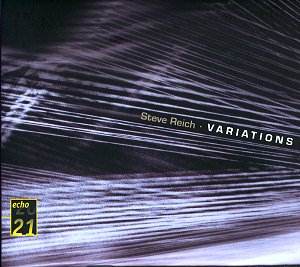Steve Reich is one of the founders and leading proponents
of minimalism, a musical current that is based on a repetitive approach,
or, as Reich calls it, ‘gradual music’. Reich’s work explores the subtle
discoveries that can be made as his music progresses through melody
lines that repeat, become familiar, then change in tiny ways. Two of
Reich’s seminal works, and two of his earliest works to truly succeed
in this approach, are included on this "compilation" CD: the
1973 compositions Music for Mallet Instruments, Voices and Organ
and Six Pianos. In 1974, Deutsche Grammophon released these
works in a three-LP set together with Drumming, and this set
the stage for minimalism to be recognized beyond the limited horizons
of downtown New York.
Both of these works feature extensive repetition, and
gradual shifts in melody, which give the listener a strange feeling
of participating in the music as it progresses. Both of these pieces
introduce phase shifting, where the instruments play in sync for a while,
then one or more of them play off the rhythm, slowly shifting until
they come full circle and rejoin the main rhythm. In the opinion of
this reviewer, Six Pianos is one of the finest musical compositions
of all time, and I vividly recall the first time I heard it, some time
in the late 1970s - the discovery at the end of this entrancing piece,
that the music has followed a cycle, and not just offered some 24 minutes
of repetition, was quite surprising.
Music for Mallet Instruments, Voices and Organ is
in the same vein, with a series of repeated motifs played on marimbas
and glockenspiels, with an electric organ pulsing in the background,
and voices singing in tones that vary in length as the piece progresses.
The 1979 composition Variations for Winds, Strings
and Keyboards was one of Reich’s first commissions for an orchestra.
This work, similar to his Music for 18 Musicians, composed around
the same period, is less repetitive than the two older pieces, and develops
melodies a bit more, yet still maintains Reich’s signature sound.
This disc is a compilation of two of Steve Reich’s
finest and most important works, together with another compelling piece
for orchestra. Not only are these among the founding works of minimalism,
but they are highly enjoyable. If you have never heard this music, this
disc is the perfect way to discover one of the most interesting and
enduring forms of contemporary classical music, and one that does not,
in any way, assault the ears.
Note: For those who own the Nonesuch box set of Steve
Reich’s works, released in 1997, this includes the two major works that
were missing from that set.
Kirk McElhearn


